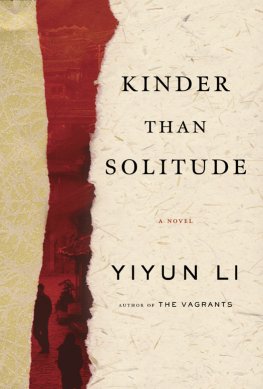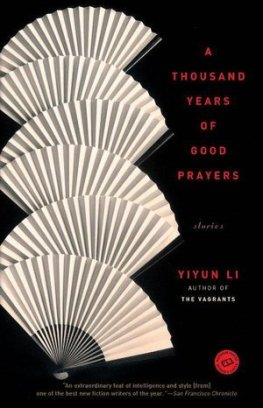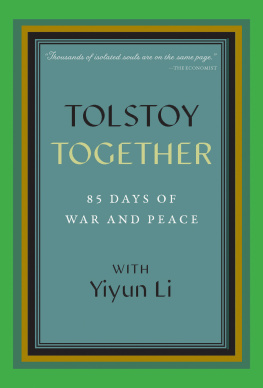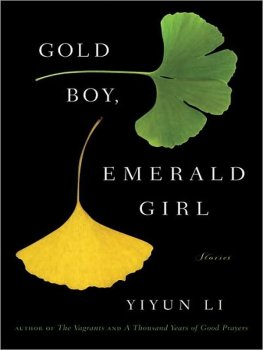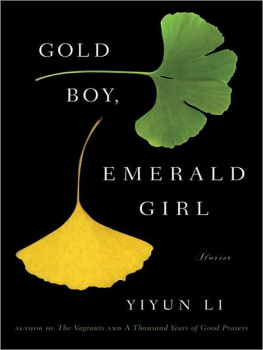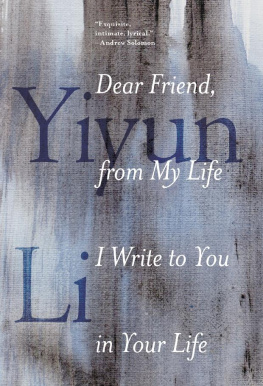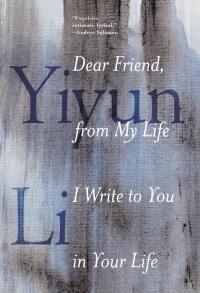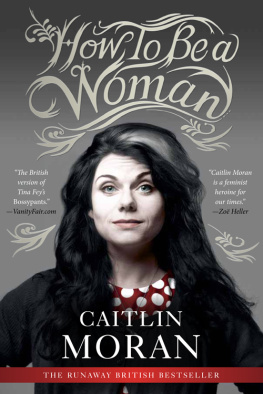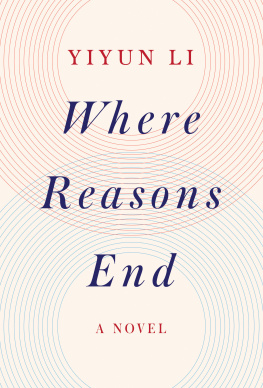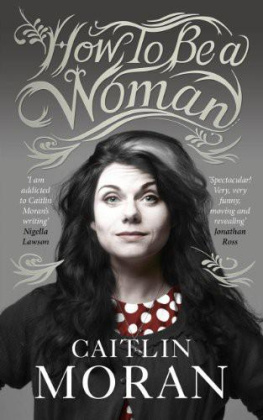Yiyun Li
Kinder Than Solitude
To Dapeng, Vincent, and James
You cant both live and have lived, my dear Christophe.
Romain Rolland, Jean-Christophe
Boyang had thought grief would make people less commonplace. The waiting room at the crematory, however, did not differentiate itself from elsewhere: the eagerness to be served first and the suspicion that others had snatched a better deal were reminiscent of the marketplace or stock exchange. A man shouldered him, reaching for multiple copies of the same form. Surely you have only one body to burn, Boyang laughed to himself, and the man glared back, as though personal loss had granted him the right to what he was not owed by the world.
A woman in black rushed in and looked around for a white chrysanthemum that must have been dropped earlier. The clerk, an old man, watched her pin it back onto her collar and smiled at Boyang. You wonder why they cant slow down, he said when Boyang expressed sympathy for what the clerk had to endure. Day in and day out. These people forget that those who rush to every sweet fruit of life rush to death, too.
Boyang wondered if the clerk whom no one wished to meet and, once met, became part of an unwelcome memory found solace in those words; perhaps he found joy, too, in knowing that those who mistreated him would return in a colder form. The thought made Boyang like him.
When the older man finished his tea, they went over the paperwork for Shaoais cremation: her death certificate, the cause of death lung failure after acute pneumonia; the yellowed residence registration card with an official cancellation stamp; her citizens ID. The clerk checked the paperwork, including Boyangs ID, carefully, his pencil making tiny dots under the numbers and dates Boyang had entered. He wondered if the clerk noticed that Shaoai was six years older. A relative? the clerk asked when he looked up.
A friend, Boyang said, imagining disappointment in the old mans eyes because Boyang was not a new widower at thirty-seven. He added that Shaoai had been ill for twenty-one years.
Good that things come to an end.
There was no option but to agree with the old mans comfortless words. Boyang was glad that he had dissuaded Aunt, Shaoais mother, from coming to the crematory. He would have been unable to guard her from strangers goodwill and malevolence alike, and he would have been embarrassed by her grief.
The clerk told Boyang to come back in two hours, and he walked out to the Garden of Perpetual Green. Shaoai would have scoffed at the cypresses and pine trees symbols of everlasting youth at a crematory. She would have mocked her mothers sorrow and Boyangs pensiveness, even her own inglorious end. She, of all people, would have made good use of a life. Her distaste for the timid, the dull, and the ordinary, her unforgiving sharpness: what a waste that edge had rusted, Boyang thought again. The decaying that had dragged on for too long had only turned tragedy into nuisance; death, when it strikes, better completes its annihilating act on the first try.
At the top of a hill, older trees guarded elaborate mausoleums. A few birds crows and magpies prattled close enough that Boyang could hit them with a pinecone, but he would need an audience for such a boyish achievement. If Coco were here, she would know how to poke fun at his shot and to look impressed when he showed her the pine nuts inside the cones, though the truth was she had little interest in these things. Coco was twenty-one, yet already she had acquired the incuriosity of one who has lived long enough; her desire too greedy for her age, or too meager was for tangible comforts and material possessions.
At the end of a path a pavilion sheltered the bronze bust of a man. Boyang tapped the pillars. They were sturdy enough, though the wood was not the best quality, and the paint had faded and was peeling in places; according to the plaque the pavilion was less than two years old. A bouquet of plastic lilies laid underneath looked more dead than fake. Time, since the economy had taken off, seemed to move at an unreal pace in China, the new becoming old fast, the old vanishing into oblivion. One day he, too, could afford if he desired it to be turned into a stone or metal bust, gaining a minor immortality for people to laugh at. With a bit of luck, Coco, or whatever woman replaced Coco, might shed a tear or two in front of his grave if not for a world without him, then for her misspent youth.
A woman appeared over the rise of the hill, and upon seeing Boyang turned so abruptly he barely glimpsed her face, framed by a black-and-white patterned scarf. He studied her black coat and the designer bag on her arm, and wondered if she was a rich mans widow, or better, a mistress. For a moment he entertained the thought of catching up with her and exchanging a few words. If they liked each other, they could stop at a village on the drive back to the city and choose a clean countryside restaurant for some rustic flavors: sweet potatoes roasted in a tall metal barrel, chicken stewed with so-called locally grown, organic mushrooms, a few sips of strong yam liquor that would make their stories flow more easily and the lunch worth prolonging. Back in the city, they might or might not, depending on their moods, see each other again.
Boyang returned to the counter at the designated time. The clerk informed him that there would be a slight delay, as one family had insisted on checking everything to avoid contamination. Contamination with someone elses ashes? Boyang asked, and the old man smiled and said that if there was any place where peoples whims would be accommodated, it was this one. Touchy business, Boyang said, and then asked if a woman had come alone to cremate someone.
A woman? the clerk said.
Boyang considered describing the woman to the old man, but then decided that a man with a trustworthy face and gentle sense of humor should be dealt with cautiously. He changed the subject and chatted about the new city regulations on real estate. Later, when the clerk asked him if he would like to take a look at Shaoais remains before they were ground to ashes some families requested that, explained the clerk; some asked to pick up the bones themselves for proper closure Boyang declined the offer.
That everything had come to an end like this was a relief as unconvincing as the pale sun that graced the dashboard as Boyang drove back to the city. The news of the death he had emailed to Moran and Ruyu. Moran, he knew, lived in America, though where Ruyu was he was not certain: America most probably; perhaps Canada, or Australia, or somewhere in Europe. He doubted that the two of them had remained in touch with each other; his own communications with them had never once been acknowledged. On the first of every month, he sent separate emails, informing reminding them that Shaoai was alive. He never spoke of the emergencies, lung failure once, and heart failure a few times: to limit the information would spare him the expectation of a reply. Shaoai had always pulled through, clinging to a world that had neither use nor a place for her, and the brief messages he sent had given him a sense of permanency. Loyalty to the past is the foundation of a life one does not, by happenstance or by will, end up living. His persistence had preserved that untouched alternative. Their silence, he believed, proved that to be the case: silence maintained so emphatically could only mean their loyalties matched his, too.
When the doctor confirmed Shaoais death, Boyang had felt neither grief nor relief but anger anger at being proven wrong, at being denied the reunion that he had considered his right: they he and Moran and Ruyu were old in his fantasy, ancient even, a man and two women who had nearly lived out their mortal lives, converging one last time at the lake of their youth. Moran and Ruyu would perhaps consider their homecoming a natural, if not triumphant, epitaph. To this celebration he would bring Shaoai, whose presence would turn their decades of accumulation marriage, children, career, wealth into a hoarders laughable collection. The best life is the life unlived, and Shaoai would be the only one to have a claim to that truth.

